- Home
- Melissa de la Cruz
Love & War Page 14
Love & War Read online
Page 14
“No, not at all,” Alex said. “The divisions between patriot and loyalist are not nearly as great as war would make them seem. You mark my words, once the United States has established itself, it will renew cordial relations with England. We have far more in common than we do in opposition. But Mr. Burr was always rather . . . stiff in his views. I wonder that he overcame them.”
“Perhaps it was simply love,” Eliza said.
Alex took a moment to lift her gloved fingers to his lips and kiss them. “Well, perhaps it was,” he said in a musing tone. “In which case, there is hope for us as a species. Still, I don’t suppose we’ll be having them over for dinner any time soon.”
“What, you do not approve of the union?” she asked.
“Oh, not at all. I approve. I approve heartily.”
“I take it you do not care for Mr. Burr?”
“Not particularly,” Alex shrugged. “The few times I met him he struck me as being rather too impressed with himself, when his success seems to me to have more to do with family connections than any great ability on his part.”
Eliza passed over this in silence. As the daughter of a Schuyler and a Van Rensselaer, she would have a hard time blaming someone for exploiting their pedigree, especially if they put it to good use. And it was important that she and Alex begin to build a network of friends, acquaintances, and others who would prove useful as they climbed the social ladder.
“Mr. Burr was quite helpful to my family during the war,” she confessed finally. “I never told you what happened at the Pastures while you were at Yorktown.”
He turned to her in surprise. “You have kept something from me?”
Eliza turned pink. “I did not want you to worry, and when we were reunited I was so happy it slipped my mind.”
She told Alex the story of the redcoat invasion and Mr. Burr’s role in their rescue. He listened intently, holding her even closer as if afraid to lose her to the enemy even as she was safe in his arms.
“I am so thankful, my angel,” he whispered, not caring who could see him nuzzle her hair with his nose as he kissed her forehead. “But alas, we cannot have the Burrs to dinner.”
“Why not?”
Alex laughed. “Have you forgotten? We only have a chair each and no servants to serve at table!”
“Oh, you!” Eliza said, swatting him with a gloved hand. “You mustn’t tease me!”
* * *
WHEN THEY RETURNED home, they worked in one room or another—shelving Alex’s law books in his study, moving a portrait of Catherine Schuyler from the front parlor to the dining room to shield it from the strong light that came in the south-facing windows, since they had no curtains yet (“Mama does like to be close to food,” Eliza couldn’t help quipping as Alex centered the picture over the fireplace), or rearranging the small but growing number of silver serving dishes in the glass-fronted hutch as new pieces came in.
But at a certain point the serious business of decorating would always give way to more playful rearranging, as Eliza stood all the forks and knives on the mantel like couples dancing a reel, or Alex took the squashes from the larder and laid them on the dining table draped in Ipswich lace like so many sleeping infants. One or the other of them would pretend to be upset by the other’s mischief, and then the perpetrator would be forced to make it up with kisses and sweet-nothings, until finally the misbehaver would grab a candle and say, “Let me make it up to you upstairs.”
13
Hamilton by Her Side
Fraunces Tavern and the Hamilton Town House
New York, New York
December 1783
After six years of British occupation, the great city of New York was a shell of its former self. Before the war, it had been the third-largest city in the northern colonies, with more than twenty-five thousand residents. It trailed only Philadelphia and Boston in size, and was on course to overtake both. But after the British conquered Manhattan in 1777, that number dropped by half as thousands of patriots fled the invaders. During the six years of British rule, the city’s population gradually recovered as loyalists from all over the colonies left the island for safe haven. Their numbers were swelled by thousands of redcoats shipped over from England, who used the city as their base of operations for the war. The once-vibrant metropolis was transformed into a massive army base, replete with all the vices one expects when large numbers of pent-up young men cluster together for months at a time. It seemed that every other storefront had been transformed into a drinking house—or a house of ill repute.
After Cornwallis’s defeat, however, both the British troops and the loyalists who depended on them for protection departed in huge numbers, some for England, others for Canada or the Caribbean. When General Washington officially entered the city on November 25, 1783, he found a ghost town of just over ten thousand people. Washington entered Manhattan this time at its northern tip, crossing over the Harlem River into Harlem Heights, reversing his journey of seven years earlier, when he had been chased from New York City all the way up Manhattan by the British commander, William Howe, and narrowly escaped onto the mainland. It was important to General Washington to ride the entire length of Manhattan to show that the whole island—all twelve miles of it, and not just the city clustered on its southern tip—was once again an American province.
For the first ten miles or so, Washington encountered nothing but forest and farmland. The farms were fallow for the winter, but even so, one could see the desolation. The sheaves still stood in many fields from last fall’s harvest, half rotted from rain and freeze and thaw, while herds of cows clustered forlornly before the closed doors of abandoned barns, waiting in vain for someone to drain their swollen udders, and brown chickens scratched for stray grains in the frozen soil, with nothing hunting their eggs besides foxes and skunks. After mile after mile of this, the neat white-and-brown farmhouses slowly grew more numerous, but only occasionally did one see smoke coming from a chimney or a sturdy farm wife retrieving a basket of apples or squash from the fruit cellar.
Finally, about two miles from New York Harbor, the city itself came into view. From a distance, it looked as Washington remembered it, and at the sight he must have breathed a sigh of relief that the British hadn’t burned it like modern-day Vandals or Huns desecrating the new Rome. As he got closer, he could see that some buildings had indeed been burned, but these were so scarce and randomly placed that he suspected they were simple house fires, unquenched due to the lack of a fire brigade. Hundreds more buildings stood empty, though, with many others only nominally inhabited and often in terrible disrepair. Shutters sagged on hinges and broken glass had been replaced with wood or oilcloth. Holes gaped in gabled roofs where shingles had not been replaced for nearly a decade.
Even more haunting, though, were the dozen or so derelict ships that stood a half mile off the island, and the smells of disease and death that wafted across empty streets from the salty chop of the East River. The British had anchored a chain of some of their oldest (and least seaworthy) frigates off Manhattan to house their prisoners of war. Even now, hundreds of American soldiers, starving, ill, and freezing, were still desperately awaiting release. By some accounts, eleven thousand patriots had died in these ships, nearly three times the number who perished on the field of battle. Bones would wash up on shore for years to come.
Yet the city still stood at the mouth of the Hudson River, from which the furs and grains and timber of the Northeast flowed to European markets, poised to become a great mercantile center and quite possibly the capital of the new nation. Its climate was milder than Boston’s and its island status rendered it easier to defend than Philadelphia or Williamsburg. The Congress of the Confederation was so convinced of the city’s bright future that they chose it as the new nation’s temporary capital, after stints in Philadelphia and Trenton. Washington shared Congress’s high estimation of the city’s symbolic value.
Still resisting all calls to take a position in the government, Washington chose Samuel Fraunces’s Queen’s Head Tavern as the place to resign his commission and bid his faithful troops farewell on December 4, 1783, before returning to Mount Vernon, his beloved plantation in Virginia. One era was closing, while another was beginning, and though the past was cloaked in victory, the future was shrouded in uncertainty. Was this the end of the beginning for the emerging nation, or was it in fact the beginning of the end?
* * *
NOT FAR FROM Fraunces Tavern, Eliza Hamilton stood in the middle of her new front parlor staring forlornly at her husband, who was balanced atop one of the room’s few chairs measuring the windows with a long spool of tailor’s tape.
“I don’t understand why you don’t just walk over to Pearl Street and bid adieu to General Washington,” she said cautiously, to her husband’s white-shirted back.
Alex waited until he had measured the height of the window and recorded the figure in his notebook before answering. “If General Washington had wanted to bid me adieu, he would have invited me,” he said curtly, before climbing down off the chair and carrying it to the room’s second window.
“Oh, Alex, you’re just being stubborn.”
Alex didn’t meet her gaze. “I served at the man’s side for four years.”
“I mean about the window,” Eliza said with some exasperation. “They are very clearly the same size. There is no reason to measure them both.”
For a moment, it seemed as though Alex was going to ignore her. He remounted the chair and reached his tape to the corner of the window. Then a chuckle erupted from him, and he hopped from the chair to the floor. “I suppose you’re right, my darling.”
Eliza pulled her chair closer to the fire. Though it was barely noon, she had been on her feet for some six hours, having awakened at six to a cold fireplace and even colder bed—Alex had already risen, and must have secreted himself in the study so as not to disturb her. She had dozed in bed for a few minutes, waiting for the maid to come in to tend to the fire, but then she snapped awake when she remembered that there weren’t three chambermaids and an equal complement of footmen to attend to such mundane duties. If she didn’t light the fire herself, no one was going to.
Alex heard her going up and down the stairs and emerged from his study to join her, and though Eliza thought to go back to bed once the fire was going, there were ash buckets to be emptied first, coal and wood to be brought in and distributed among the house’s three floors, and then the measuring tape had appeared in Alex’s hand, and here they were.
She fixed him in the eye and smiled wanly. “You’re also being stubborn about General Washington.”
Alex opened his mouth to argue, then thought better of it. He looked about for somewhere to sit, but there was only the faded floorboards, bare of any rug or carpet.
“You shouldn’t take this personally,” Eliza continued. “I have heard from at least three different people that General Washington invited no one to see him off. The only reason he came to the city was to sign the documents that formally transferred governing power from General Carlton back to the state of New York. By all accounts, his goal was to slip out with as little fanfare as possible.”
“A ludicrous idea,” Alex dismissed.
“Don’t be disrespectful,” Eliza said curtly. “And yes, maybe it was unrealistic of General Washington to think he could escape to Virginia without some kind of ceremonial before his men. But can you blame him? By your own description, he was never a public personality and accepted his role as commander in chief only because of his love for his country. But the bonds he built with his men—including you!—were real, and he deserves a final embrace from them before he resumes life as a country squire.”
Alex sighed. He had been up since four in the morning answering letters, and was as weary as his wife. The bare window made the room rather cold on this late fall day, and so he walked toward Eliza and sat at her feet in front of the fire, his back leaning against the draped fullness of her woolen skirts. “Mark my words, Eliza, he shall not remain a country squire for long. This country is not yet willing to accept a unifying central government, but it will rally behind its heroes—”
“As the gathering at the Queen’s Head demonstrates,” Eliza put in.
“Indeed. And when General Washington realizes that the independent nation he fought on behalf of for seven years is in jeopardy, he will return to public service. As I said, the American people are not yet ready to accept a single government. But they would accept a single leader—if that leader were General Washington. Although I suppose his title wouldn’t be general then. It would be prime minister or perhaps president or, heaven forbid, king.”
“Oh, Alex, no! You don’t think the American people would ever again consent to become subjects of a monarchy, do you?”
“Stranger things have happened. The problem with kings and queens is that when a worthy figure appears—a Solomon, say, or a Charlemagne—their grateful subjects make the mistake of thinking that their descendants will be every bit as wise and just as they are. But the ability to lead a nation is not a heritable trait like hair color or skin tone. It is a rare skill, indeed, and manifests itself only in persons whose unique combination of temperament, training, and experience have made them capable of seeing past the benefits that they can derive from their country, to the benefits that they can bestow upon that country.”
Eliza smiled to herself, glad that Alex’s gaze was fixed elsewhere—she didn’t want to make him self-conscious, or think she was mocking him. Even after four years, she was still moved by her husband’s articulateness and vision, and she found tears had come to her eyes. He had the ability to sound as though he were reading from the pages of a well-edited book, even when he was speaking off the top of his head.
She stroked a lock of his strawberry-blond hair. “It sounds as though you are declaring your own qualifications for the role,” she said, curling the strand around her index finger and giving it a teasing tug.
“Me? To be sure, I hope to serve my country. But if I am honest about my own capabilities, I am less executive than administrator. I am, perhaps, too selfish to be a great leader. So selfish,” he added, turning to her with a smile and catching her hand in his, “that I would rather measure rooms for curtains and carpets with my beautiful wife than abase myself one last time before a man who was willing to make use of my services but not reward them until he was threatened with losing me. Well, let him have his turtle soup with his admirers. He has earned their veneration. But I have earned his, and if he cannot see that, then I see no reason to leave the far more amiable company in which I find myself.” And, pulling her hand to his lips, he bestowed upon it a dozen quick kisses.
Eliza listened to her husband with mixed emotions. On the one hand, she understood his frustration. So much of their marriage had been consumed by the war, by Alex’s service to his country, and by General Washington’s needs. But she also knew how much General Washington had meant to Alex, and how much his country meant to him, too. Still, she also adored it when he kissed her hand like this, and it was another moment before she was able to speak again. Duty could be an annoyingly inconvenient thing, but that was the blessing of marriage: There would always be time for more kissing later.
“Turtle soup?” she said at last, making a face. “The general eats that? Really?”
“I am told it is quite delicious.”
“And I am told that opossum has a gamy flavor not unlike rabbit, but I’m still not going to eat anything that sports a hairless tail like a rodent. Well then,” she continued, “far be it from me to ask you to leave my—what was the word you used—”
“Amiable.”
“Yes, my amiable company.” She patted him on the head and he lolled under her touch like a spaniel puppy. “But perhaps you would care to accompany me to the Broadway, where I saw a charmi
ng dry goods merchant.”
Alex chuckled. “I think it’s just called Broadway. No ‘the’ needed.”
“I like the way ‘the Broadway’ sounds,” Eliza retorted, to further laughter from Alex. “At any rate, I found this shop quite charming, and thought that we might find some fabric for the curtains, and perhaps also something to cover the sofas and chairs that Mama is sending from Albany.”
* * *
THEIR LACK OF china was solved not a half hour later, in the mercer’s shop that Eliza led Alex to on Broadway. In the middle of a relatively scant, though not unattractive, assortment of brocades and jacquards sat an entire service of the finest bone china Eliza had ever seen, painted with an intricate yet delicate pattern of brightly colored birds and flowers: cups and saucers, plates and chargers, salad bowls, dessert plates, and a full complement of serving dishes as well, including a four-legged covered fish plate that could have held a thirty-pound lobster.
It was an odd display to see in a fabric store, and Eliza was half afraid it was for show only, to set off the embroidered tablecloth beneath. She was delighted, then, when she made inquiries of the proprietor, to learn that the dishes had been left behind in one of the many empty houses the British abandoned when they fled the city. They could be had, she was told, “for a song,” though the price she was quoted, fifty shillings, seemed more like an opera than a ditty. In comparison, they were only going to pay their servants two pounds a month, for instance, in addition to room and board.
“A song?” Alex echoed, overhearing. “Well, turn up the lights, Broadway, because I’m about to start singing!” And, in fact, he crooned over the dishes as if they were a nursery full of newborn infants. Like Eliza, he savored the finer things in life, but unlike his wife, he had not grown up surrounded by them. On the one hand, this ensured that he never took his newfound privilege for granted, but it also made him a bit covetous, and sometimes a spendthrift as well. An impoverished childhood never fully leaves you, and Eliza was learning that her husband needed to surround himself with expensive items to remind himself that he was no longer poor—even if he wasn’t exactly rich either.

 Gates of Paradise
Gates of Paradise Someone to Love
Someone to Love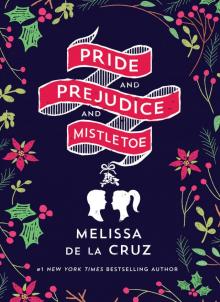 Pride and Prejudice and Mistletoe
Pride and Prejudice and Mistletoe Serpent's Kiss
Serpent's Kiss The Au Pairs
The Au Pairs Wolf Pact
Wolf Pact Witches 101: A Witches of East End Primer
Witches 101: A Witches of East End Primer Jealous?
Jealous? Cat's Meow
Cat's Meow Misguided Angel
Misguided Angel Birthday Vicious
Birthday Vicious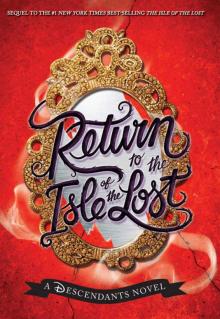 Return to the Isle of the Lost
Return to the Isle of the Lost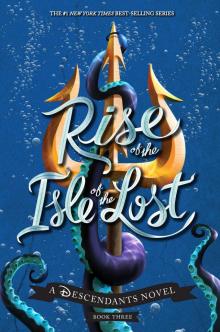 Rise of the Isle of the Lost
Rise of the Isle of the Lost Angels on Sunset Boulevard
Angels on Sunset Boulevard Double Eclipse
Double Eclipse Blue Bloods
Blue Bloods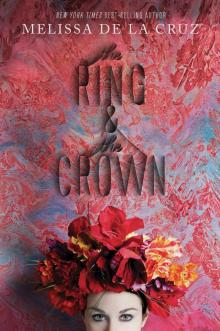 The Ring and the Crown
The Ring and the Crown The Ashleys
The Ashleys Les vampires de Manhattan
Les vampires de Manhattan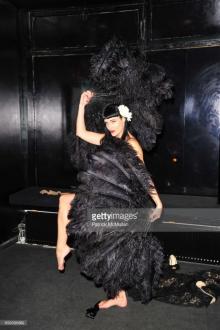 The Van Alen Legacy
The Van Alen Legacy Sun-Kissed
Sun-Kissed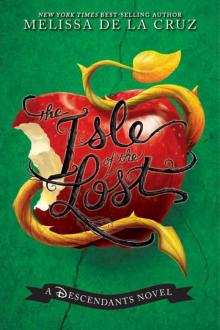 The Isle of the Lost
The Isle of the Lost Masquerade
Masquerade Witches of East End
Witches of East End Diary of the White Witch
Diary of the White Witch Crazy Hot
Crazy Hot Lost in Time
Lost in Time White Nights: A Vampires of Manhattan Novel
White Nights: A Vampires of Manhattan Novel Revelations
Revelations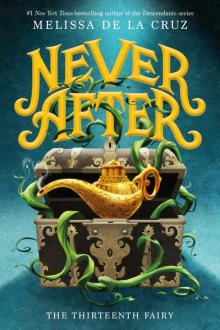 The Thirteenth Fairy
The Thirteenth Fairy The Birthday Girl
The Birthday Girl Lip Gloss Jungle
Lip Gloss Jungle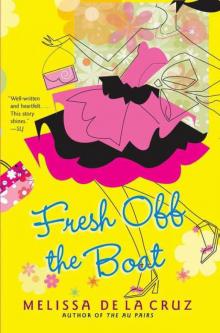 Fresh Off the Boat
Fresh Off the Boat Something in Between
Something in Between Winds of Salem
Winds of Salem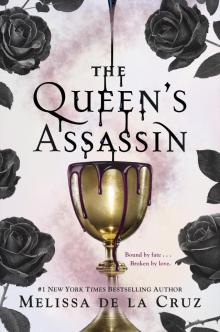 The Queen's Assassin
The Queen's Assassin Love & War
Love & War Social Order
Social Order Skinny Dipping
Skinny Dipping 29 Dates
29 Dates Popularity Takeover
Popularity Takeover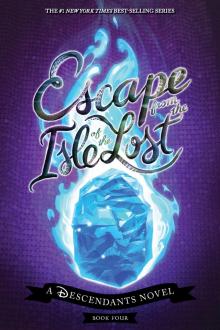 Escape from the Isle of the Lost
Escape from the Isle of the Lost Beach Lane
Beach Lane Bloody Valentine
Bloody Valentine All for One
All for One Wolf Pact: A Wolf Pact Novel
Wolf Pact: A Wolf Pact Novel The au pairs skinny-dipping
The au pairs skinny-dipping Lip Gloss Jungle (Ashleys)
Lip Gloss Jungle (Ashleys) Crazy Hot (Au Pairs)
Crazy Hot (Au Pairs) Because I Was a Girl
Because I Was a Girl Blue Bloods 6 - Lost in Time
Blue Bloods 6 - Lost in Time Sun-kissed (Au Pairs, The)
Sun-kissed (Au Pairs, The) Bloody Valentine bb-6
Bloody Valentine bb-6 Golden
Golden Lost in Time_A Blue Bloods Novella
Lost in Time_A Blue Bloods Novella Alex and Eliza--A Love Story
Alex and Eliza--A Love Story Blue Bloods: Keys to the Repository
Blue Bloods: Keys to the Repository Birthday Vicious (The Ashleys, Book 3)
Birthday Vicious (The Ashleys, Book 3)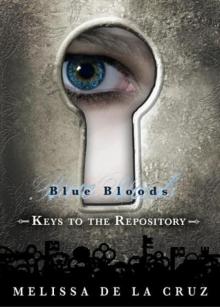 Keys to the Repository
Keys to the Repository Lost In Time (Blue Bloods Novel)
Lost In Time (Blue Bloods Novel) Stolen
Stolen Girls Who Like Boys Who Like Boys
Girls Who Like Boys Who Like Boys the au pairs crazy hot
the au pairs crazy hot Blue Bloods bb-1
Blue Bloods bb-1 Witches 101
Witches 101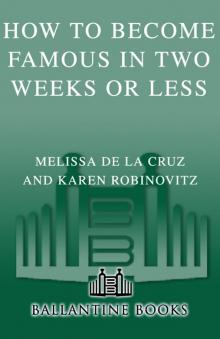 How to Become Famous in Two Weeks or Less
How to Become Famous in Two Weeks or Less Frozen hod-1
Frozen hod-1 Jealous? (The Ashleys, Book 2)
Jealous? (The Ashleys, Book 2) Misguided Angel (Blue Bloods)
Misguided Angel (Blue Bloods) Winds of Salem: A Witches of East End Novel
Winds of Salem: A Witches of East End Novel The Gates of Paradise
The Gates of Paradise Beach Lane Collection
Beach Lane Collection Wolf Pact, The Complete Saga
Wolf Pact, The Complete Saga Gates of Paradise, The (Blue Bloods Novel)
Gates of Paradise, The (Blue Bloods Novel) Vampires of Manhattan
Vampires of Manhattan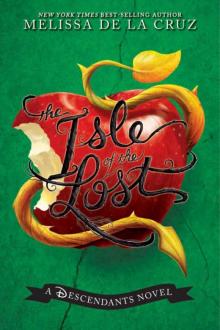 Isle of the Lost
Isle of the Lost Love & War_An Alex & Eliza Story
Love & War_An Alex & Eliza Story The Ashley Project
The Ashley Project Love & War--An Alex & Eliza Story
Love & War--An Alex & Eliza Story